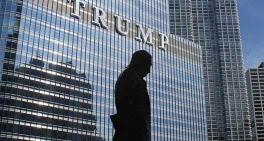Michigan's top court hearing cases over guns, schools
U.S. Court News
A gun openly carried by a spectator at a school concert in 2015 has turned into a major legal case as the Michigan Supreme Court considers whether the state's public schools can trump the Legislature and adopt their own restrictions on firearms.
The case from Ann Arbor has been on the court's docket for more than a year. But arguments set for Wednesday are getting extra attention in the wake of a Florida school shooting in February that killed 17.
There's no dispute that Michigan law bars people from possessing a gun inside a weapon-free school zone. But there's a wrinkle: Someone with a concealed pistol permit can enter school property with a gun that's openly holstered.
Though rare, it happened three years ago at a choir concert at Ann Arbor Pioneer High School, scaring teens, staff and spectators. The school board responded by banning all guns, with exceptions for police.
"If a student were to bring a gun into a school, that would be worthy of an expulsion," said Jeanice Kerr Swift, superintendent of Ann Arbor schools. "So why would it be different for other folks? ... What this case is about is local communities having a choice."
Separately, the Clio district, north of Flint, has a similar policy. The Supreme Court is hearing challenges from gun owners in both communities.
Gun-rights advocates argue that local governments, including elected school boards, can't step into an area reserved for the Michigan Legislature under state law. They point to a Lansing-area library whose ban on the open display of guns was struck down by the state appeals court in 2012.
But in Ann Arbor and Clio, another three-judge panel at the appeals court said schools are in a different category and have freedom to further restrict guns. The districts won that round.
Ken Herman, a paramedic and gun-owning parent who sued the Clio district, believes the appeals court got it wrong. In a filing at the Supreme Court, his attorney said schools have a duty to keep students safe, but lawmakers have "chosen to reserve the power to regulate the possession of firearms."
Herman, 36, said he carries a gun for protection wherever it's allowed. He said fears would be eased if more adults educated kids about proper gun ownership.
Related listings
-
State appeals court reinstates California's right-to-die law
U.S. Court News 06/16/2018A state appeals court has reinstated — at least for now — California's law allowing terminally ill people to end their lives.The Fourth District Court of Appeals in Riverside issued an immediate stay Friday putting the End of Life Option ...
-
Egypt refers 28 to criminal court for forming illegal group
U.S. Court News 06/08/2018Egypt's chief prosecutor has referred 28 people to a criminal court on charges including forming an illegal group aiming to topple the government.Sunday's statement by prosecutor Nabil Sadek says the suspects face an array of additional charges, incl...
-
UK Supreme Court criticizes Northern Ireland abortion laws
U.S. Court News 06/06/2018Britain's Supreme Court on Thursday criticized Northern Ireland's strict anti-abortion laws but dismissed a legal challenge.A majority of the court decided that the Northern Ireland Human Rights Commission, which initiated the case, did not have the ...

Any contracts or any transactions can go awry at any time
We know your business means a lot to you and want to understand all the aspects of your business so that we can help you in the best ways possible. We don’t discriminate depending on the size of your company. Our mission statement is to represent all business owners and entrepreneurs by navigating them through the rough waters of business litigation and guiding them to success.
We are attorneys who want to make sure we understand your business objectives and goals before we start providing you with legal counsel individualized to your business. We know what it means to be dedicated to your business. After all, we are a business as well. And just like you, we want to provide the best service we can to our clients.
Any contracts or any transactions can go awry at any time. Sometimes, making important business decisions without legal help from business attorneys could cost you your business.We don’t want you or your business to be misconstrued by anyone. Our attorneys make sure that we communicate with you often to make sure we are giving you the legal guidance you need at all times. We make sure we are responsive in a timely-manner with every single one of our clients to help them identify risks and prevent legal battles before they arise.




